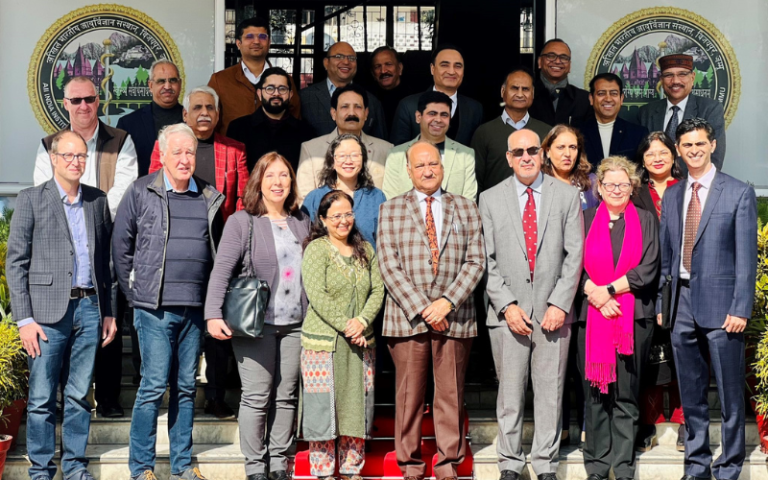Improving medical leadership in India and England
Professor Julie Davies (UCL Faculty of Population Health Sciences) used UCL-AIIMS Strategic Partner Funds to understand and improve leadership training for medics in India and England.

30 April 2024
The process and training for people to take on leadership positions in hospitals and other medical settings vary across the world. However, it is widely felt that there isn’t enough medical leadership development and support provided. The COVID-19 pandemic in particular put a spotlight on the need for well-supported leaders in healthcare. Many doctors stepped up into leadership positions and formal or informal roles during the pandemic, but stepped down again afterwards due to being stressed, overworked, and to help reduce waiting lists. There is also a low proportion of women in medical leadership roles, further highlighting a need for more training and support to achieve better gender equality.
In response to this, Professor Julie Davies applied for UCL-AIIMS Strategic Partner Funds with Dr Kamal Gulati from the All India Institute of Medical Science (AIIMS), New Delhi, to study medical leadership in India and England in greater depth. Together with local Chevening funding subsequently awarded in 2023, the team was able to enhance their understanding of the realities of medical leadership.
How do you develop great medical leaders?
“In India, mostly male doctors are in hospital leadership positions such as Director, CEO, or Medical Superintendent, but often without having any formal leadership training beforehand,” Julie explained. “In the UK, we have an NHS graduate management trainee scheme, which is for non-medics to become managers. Neither system is optimal. There is an argument that it's useful to have physicians and other clinicians with MBAs or leadership skills and training running healthcare organisations, and we now have an MBA Health programme at UCL. But I'm quite interested to know what kind of leadership development most people currently get. Through this study, we found it was very little.”
Calling the project Enabling Medical Leadership in India and England’ (EMLIE), the team generated new datasets about these issues, based on 60 one-to-one qualitative interviews. They also ran four workshops with 120 attendees from India and England to find out more about what works in terms of leadership training and development in healthcare contexts. They looked at the key challenges to effective leadership development and discussed the role of mentorship. Some UCL MBA Health students have subsequently become involved in mentoring clinicians in India through a LinkedIn group.
One key finding of this work was the lack of women in medical leadership positions. “In India, only about 18% of women are in leadership roles in healthcare,” Julie said. “We found huge outliers in some specialisms too. Less than 1% of spine surgeons in India are women, and in the UK, less than a quarter of trainees in orthopaedics are women.”
The team is recommending that medics at all levels, from undergraduate to consultant level, should have formal leadership development throughout medical school and beyond. In the UK, some medics interviewed for the study only did a half-day leadership development workshop before applying for a consultant role, which the team says is not enough.
Julie and her collaborators also advocate for better gender equality reporting, women-only development programmes, mentoring, flexible working and family-friendly policies, which will be key to improving medical leadership.

Professor Julie Davies and Dr Kamal Gulati (bottom row, far right) alongside colleagues involved in the project.
Further steps to improve medical leadership
Given the success of the work done so far, Julie is continuing to collaborate with her counterparts in India. They are mentoring female and male medics in India, including at a new hospital in AIIMS Jammu which has strong links with the Indian Institute of Management Jammu and the Indian Institute of Technology Jammu. This is opening up further opportunities for collaboration.
They are also analysing the gender demographics of physicians in academic medicine at different levels in India. Additionally, the team published a paper in BMJ Leader on the project, and in March 2024 they hosted a session for International Women’s Day about career crafting and flexible working.
The team is currently gathering some positive stories about medical career development and leadership for another academic paper. Although both India and England have a “long way to go” according to Julie, both countries are also making gradual progress in gender equality in the medical profession. The pandemic even helped women in both countries with their careers, as there are some stories of female medics being able to take on more shift work after their partners began working from home, which helped with childcare issues.
“People are having some really interesting conversations about what it’s like to be a medic in different places,” Julie said. “This funding has enabled us to get an in-person understanding about the cultures and contexts in different countries. And we’ve built up a community of collaborators that has gone beyond the scope of the original project proposal. I’d never thought of doing research in India before and I had never visited the country before this. It’s really exciting, especially with projections that India will become the world’s third-largest economy by 2027.”
Links
- UCL Strategic Partner Funds
- Professor Julie Davies
- BMJ Leader: Enabling medical leadership in India and England: A comparative study – EMLIE
- The Lancet: Addressing leadership competency gaps and gender disparities in India’s medical workforce: a call to action
- BMJ Leader: Striving for equity: exploring gender-inclusive medical leadership in India
- LSE: Where are the Women Medical Leaders in India?
- New Thinking: India Must Address Leadership Competency Gaps and Gender Inequalities in the Medical Workforce
- NIKKEI Asia: Women in India have a key role to play in health care leadership
- YouTube: AIIMS New Delhi-UCL Medical Leadership Development Research Project
Featured image
Credit: iStock / skynesher
 Close
Close

